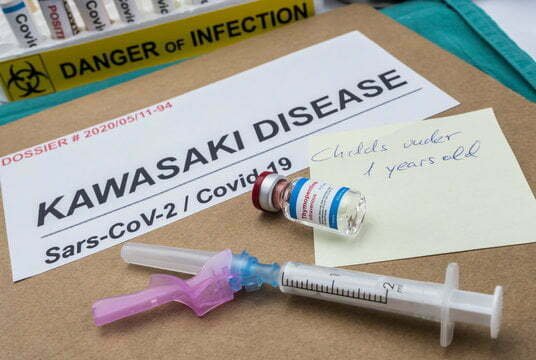
Kawasaki disease is an acute febrile illness that primarily affects children and is characterized by inflammation of the blood vessels. Symptoms may include fever, rash, swollen lymph nodes, red eyes, cracked lips, and peeling skin on the hands and feet
The symptoms of Kawasaki disease can vary, but typically include:
It is important to note that not all symptoms may be present and that the disease can sometimes be difficult to diagnose. If you suspect that you or your child may have Kawasaki disease, it is important to seek medical attention immediately.
Your pediatrician or doctor would do the physical examination of your child along with that they would ask about :
Based on the physical examination and history, various investigations like Blood Tests, Echocardiogram, Chest X-rays would be conducted.
Kawasaki disease is curable if the treatment is started on time. So it is advised to consult your doctor if the symptoms like high-grade fever, rashes around the body parts , redness of eyes and associated symptoms are observed.
Treatment
According to the symptoms, your doctor would prescribe the medications . Some medicines like Aspirin is used in the treatment to prevent the clot formation. Drugs such as gamma globulins are given intravenously for few hours as this could help in fighting infection.
The treatment is usually done in the hospital and if the abnormal findings are observed in echocardiogram, X-rays the child is further referred to concerned specialties.
Complications
Kawasaki disease poses serious complications if the disease is left untreated, it could cause inflammation of blood vessels of the heart especially coronary arteries which is ultimately a most serious complication. Inflammation in blood vessels could increase the chances of formation of blood clots that could even cause heart attack due to poor blood supply and improper oxygen supply to the heart.
Thus the treatment should be started on time to prevent fatality like death and before it gets more serious.
Follow up
Follow up with the children who have had Kawasaki disease is important, to evaluate if the child is recovering or not. A good amount of rest, a proper diet, healthy lifestyle is important. Keep a check on symptoms especially fever, get investigations done as advised by your doctor is included in follow-up care.
There have been reports of an increase in the incidence of Kawasaki disease-like symptoms in children following COVID-19 infection, particularly in areas with high rates of COVID-19 cases. This condition has been referred to as pediatric multisystem inflammatory syndrome (PIMS), or more recently as multisystem inflammatory syndrome in children (MIS-C).
MIS-C is a rare but serious condition that can cause inflammation of the blood vessels and multiple organ systems, including the heart, lungs, kidneys, brain, and gastrointestinal tract. The symptoms of MIS-C can vary, but often include fever, abdominal pain, vomiting, diarrhea, rash, and conjunctivitis. Some children may also experience respiratory distress, shock, or organ failure.
While the exact cause of MIS-C is still being studied, it is thought to be related to the body’s immune response to COVID-19 infection. Most children with MIS-C will require hospitalization and treatment with intravenous immunoglobulin (IVIG), steroids, and other supportive therapies. However, with prompt diagnosis and treatment, most children will make a full recovery without any long-term complications. It is important to note that not all children who have had COVID-19 will develop MIS-C, and the condition is still considered to be rare.
It is very important to take precautions and to prevent exposure to covid 19 to prevent any serious complications. The following precautions could help –
Make your kids wash their hands with soap and water on a regular basis
Make a habit of practicing social distancing, guide them to stay at least 6 feet away from people if meeting outside the home.
Avoid contact with people who have cough, cold, fever.
If your child is at least 3 years old, make them wear a face mask in incase they are outside in a public gathering.
Guide them not to touch their nose, eyes, mouth with dirty hands.
Disinfect and do proper cleaning of the surface areas of the house such as door handles, tables, chairs, etc that your child frequently touches.
Wash their clothes in disinfectant like Dettol, their bathtubs, toys, etc on regular basis.
Prevention is always better than cure. The only best way is to prevent your child from getting infected by coronavirus by following the proper guidelines and precautionary measures.
There is a need to be aware and to create awareness among other parents and children who are not well versed with it. As well as contact your doctor immediately in case you find any symptomatic manifestations of covid 19 or Kawasaki-like symptoms in your infants and children.